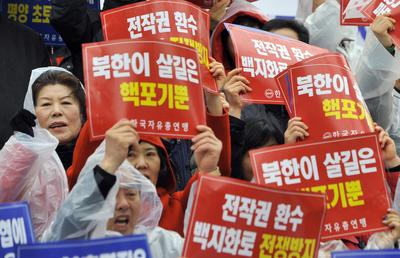Earlier optimism arose from signs that Kim Jong-un was changing North Korea’s power structure. While his father, Kim Jong-il, preferred to rule by centring power in the military, Kim Jong-un has gradually worked to reassert the Workers’ Party of Korea’s control over the military. But rather than being a sign of Kim Jong un’s strength, this may be an indication that he is not confident in his own ability to control the military or keep his grip on power in the face of a serious challenge from military elites. Indeed, such changes to the power structure appear to have increased the need to placate military demands and continue past patterns of military adventurist behaviour. Thus North Korea is likely to continue to try to strengthen its military capabilities and negotiating leverage. This approach may be based on North Korea’s belief that its nuclear weapons and delivery systems serve as an important deterrent and the feeling that it needs to prove the credibility of its nuclear weapons and launching devices, which are now said to be able to strike the United States mainland. Military strengthening may also be a tactic for seeking external assistance, such as through diplomatic blackmail to prop up its faltering economy.
The big question going forward is how to deal with the North Korean nuclear threat. There is an urgent need for policy consistency among relevant nations, in particular strong economic sanctions measures through UN Security Council resolutions, contingency planning in case North Korea launches adventurist military provocations, and ultimately, a diplomatically negotiated comprehensive settlement. Also crucially, negotiations must be conducted with North Korea’s true power centre and not necessarily its Ministry of Foreign Affairs.
Recently, great attention has been focused on the need for policy consistency among nations and the role of China. While Japan, South Korea, and the US have pushed for tougher sanctions, such those passed by the UN Security Council earlier this month, the efficacy of sanctions can only be realised if all nations apply them. Most crucially, this means persuading China to implement sanctions effectively and use its economic leverage over North Korea. There are some signs that the Chinese leadership is losing patience with North Korea, and China agreed to increase the severity of sanctions in the latest UN resolutions against North Korea after both the December rocket launch and the February nuclear test. Moreover, China lost face after it publicly warned North Korea against going ahead with its third nuclear test. But whether the balance has actually been tipped among China’s foreign policy makers — away from the fear of refugee flows and the concept of North Korea as a buffer state and toward the realisation that failure to punish North Korea is seriously damaging China’s international credibility and regional stability — remains unclear.
To this end, Japan, South Korea, and the United States must present a clear and united message that China’s refusal to adequately enforce sanctions against North Korea will have seriously negative ramifications beyond affairs on the Korean Peninsula. In the worst-case scenario, China risks losing its place as a credible stakeholder in the region. How the new leadership under Xi Jinping will react over the next few months will provide a litmus test as to whether a coordinated approach can be forged. Ultimately, without coordination between the other five Six Party Talks members (China, Japan, Russia, South Korea, and the United States) vis-à-vis North Korea, the current pattern of negative relations between North Korea and the outside world will continue its downward spiral.
Hitoshi Tanaka is a senior fellow at the Japan Center for International Exchange and chairman of the Institute for International Strategy at the Japan Research Institute, Ltd. He previously served as Japan’s deputy minister for foreign affairs. This article is an extract from East Asia Insights Vol. 8 No. 1 March 2013, which is available in full here, and is reprinted with the kind permission of JCIE.


The sanctions are worthless. The only thing that will make it clear to the North Koreans is an act of aggression. A threat. I don’t think they really pose a threat at all…they know their nuke is a bargaining tool and they use it to it’s fullest potential in that sense. Still wish our international leaders would get a spine on the matter however.